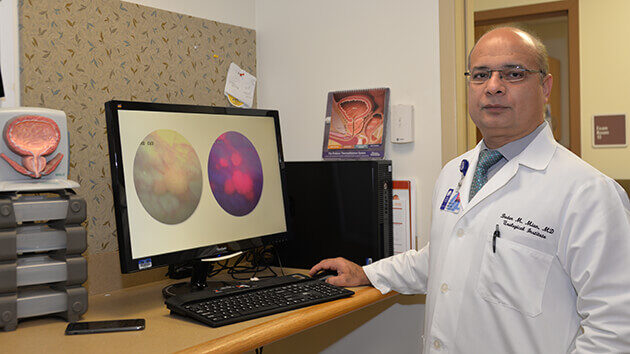Study Shows Opioid Prescriptions Rarely Needed After Urologic Cancer Surgery

Nonopioid medications were effective in controlling pain for nearly all patients who had major surgery for bladder, kidney, or prostate cancer
A study by Albany Medical Center urologists, published in JAMA Surgery, concluded that patients who had major abdominal/pelvic surgery rarely needed prescription opioid medications to control their pain after they were discharged from the hospital. Further, no adverse effects were seen regarding complications or recovery in patients who did not take opioid pain medications after their surgery.
“These results are exciting as they indicate we can essentially eliminate opioid prescriptions after urologic cancer surgery, which is important not only for an individual patient’s recovery, but also for reducing excessive opioids and potential misuse in the community,” said Badar M. Mian, MD, professor in the Department of Urology at Albany Medical Center and the lead author of the study.
Conducted between May 2017 and June 2021, the study included more than 650 Albany Medical Center patients who had an open (traditional) or minimally invasive radical cystectomy for bladder cancer, a radical or partial nephrectomy for kidney cancer, or a radical prostatectomy for prostate cancer.
Patients were divided into three groups: a control group who were prescribed opioids at discharge, a lead-in group who were prescribed opioid medications with reduced dose, and the “NOPIOIDS” group who were not prescribed opioid medication following their discharge from the hospital. Patients in the NOPIOIDS group were given detailed instructions on when to take two over-the-counter pain medications, acetaminophen and ibuprofen, in place of any opioid medication.
Nearly 98 percent of patients in the NOPIOIDS group did not require an opioid medication for their pain; those who did had all undergone kidney surgery and were not able to use drugs like ibuprofen due to concerns about kidney function. Further, less than three percent of patients in the NOPIOIDS group called the clinic with pain-related issues. The group also saw no increase in complications that could result from inadequate pain control and limited mobility, such as pneumonia, deep venous thrombosis, pulmonary embolism, or readmission.
“Use of opioid medications for pain control causes side effects such as nausea, constipation, sleepiness, and confusion which can further slow the recovery,” said Dr. Mian. “All patients should expect adequate pain control to allow them to function after surgery. This study shows that pain control and recovery don’t have to be compromised if we emphasize presurgical patient education about opioid alternatives, and instruct the physicians to employ a number of readily available nonopioid measures to control pain and maintain normal function.”
The study, “Implementation and Assessment of No Opioid Prescription Strategy at Discharge After Major Urologic Cancer Surgery,” is available on the JAMA website.